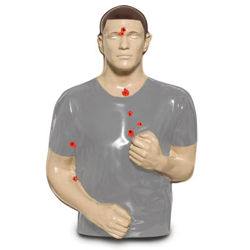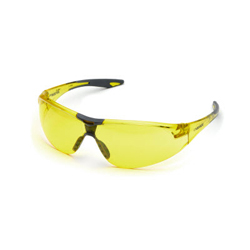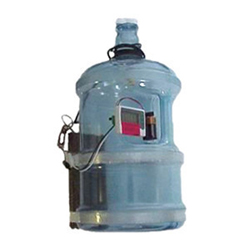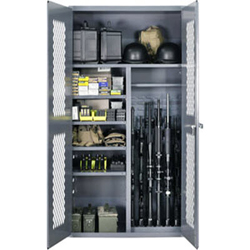For many firearms enthusiasts, the fascination with guns of all kinds is often more than just a hobby: shooting is a sport, a lifestyle, and even a means of putting food on the table. Private gun ranges offer space for the exact instruction, experienced supervision, and most importantly, the practice required for proper gun safety and marksmanship.
Zoning requirements for private gun ranges vary by state and locality. Texas leaves most land use regulations to individual counties and subordinate municipalities, only imposing a few limitations. Ask your local government offices for regulatory information specific to gun ranges in your area.
Whether you are a sportsman in need of a regular practice range, a professional interested in opening a commercial shooting field, or even just a hobbyist wanting a good look at the target of your passions in action, you will want to keep reading for important information on local gun range regulations.
Zoning Requirements for a Private Gun Range
Several distinctions can be used to describe a gun range, such that there can be a range for almost every kind of firearm enthusiast. Regardless of similarities, like the firing distance or the kind of target used, firing ranges are generally divided into two elementary categories: outdoor ranges and indoor ranges.
Local ordinances tend to vary for each category of gun range, imposing differing limitations on similar qualities that reach from participant capacity to lighting requirements. Additionally, the difference in regulations for both classes of shooting range may also vary from one region to the next.
It will also be important to consider the legal classification of your private gun range. Regional codes governing land usage are likely to differentiate between private gun ranges for personal use and private gun ranges for commercial use, and have equivalently different expectations for each variant.
Zoning Regulations under Local Authority
Regulations for land usage are most often established at the level of county and/or city governments. State governments, including the State of Texas, may establish guidelines or provide working administrative examples of possible regulations, but can not explicitly direct regional governments beyond the letter of state legislation.
As a result of this institutional dynamic, local municipalities have a great deal of freedom when creating their zoning requirements. Additionally, state ordinances that directly address this freedom and the regulations drafted under it are in place only to ensure that regional governments are unable to contradict federal and state law.
Common zoning requirements established at the municipal level for private firing ranges usually address:
- Location: Local governments are granted the ability to regulate the discharge of firearms within city limits (if the government is a city), unless the gun is being fired in a reasonably safe manner and within the confines of a sports shooting range. This includes the firing of rounds within 300 feet of an occupied building.
- Zoning: At their own discretion, municipalities are allowed to design regulations on zoning and land usage, as well as business ordinances and fire codes, on the condition that their regulations do not intentionally limit or prohibit firearm or firearm-related commerce.
- Hours of Operation: County and city governments are allowed to regulate and enforce limitations on the operating hours of a firing range as long as the limitations are not more stringent than the most lenient limitations on operational hours for any other business. This comparative excludes places that sell alcohol.
- Unlicensed Carrying: Municipalities can regulate and enforce rules that disallow anyone not in possession of a carrying license from taking their firearm to public spaces, governmental meetings, schools, and political rallies. This may apply to shooting range members if the range is situated near these or similar areas.
- Licensed Carrying: Local governments are allowed to regulate and enforce carrying rules even on citizens in possession of a carrying license, so long as the use of the rule is based in another, pre-existing law not already and explicitly barred by the state’s legislative authority.
If there is a conflict between local zoning regulations and the construction or operation of your private gun range, then you may consider reaching out to your appropriate local representative or government office to discuss your options. In some circumstances, it may be possible to request a waiver from certain rules or propose zoning changes.
Additionally, since these regulations are created and implemented on such a low governmental level, there are often opportunities for sport shooters and firearm enthusiasts to influence local administration by simply participating in their local government.
Marksmen that are particularly active in the community may consider founding or joining a local gun hobbyist’s group, attend town hall meetings, or even run for offices if they are qualified. Other political activism techniques, such as protests, the creation of educational circulars, and consistent participation in local elections can also be of use.
Limitations on Local Zoning Authority
The State of Texas, as well as its legislative and judicial bodies, assumes authority over any rules and regulations created or enforced by its summary principalities. As such, orders issued by a local court are still considered subordinate to the state’s legislation, and regulatory attempts to circumvent the state’s legislative power are considered void.
This is extremely important in the context of zoning requirements. While the municipal zoning arguments that first come to mind may involve school district jurisdictions or disputes over county borders, the legal reach of a locality’s zoning authority can go far beyond dissecting city blocks into residential and commercial properties.
As a result, it is important to know not only your personal rights regarding firearms, but the rights of your city or county and your state as well. This will assist any marksman hoping to own a private firing range in protecting the legality of their practice field if their region attempts to overstep the bounds of its jurisdiction in the following ways:
- Commerce: Municipalities are forbidden from drafting and enforcing any regulation with the purpose of making firearm and firearm-related commerce difficult. This can include the manufacturing, trading, and selling of firearms, as well as that for firearm accessories and ammunition.
- Persecution: Local governments are not allowed to cite, charge, or otherwise persecute a sport shooting range unless and until the range has violated a noise regulation or other compliance condition. Additionally, if no regulation is in effect that addresses the levied charge, then the range can not be persecuted.
- Location: The drafting and enforcement of any local zoning regulations addressing the location or operation of a shooting range can not deviate from the long-term land usage plan of the local government. This offers range owners further protection from regulations designed to adversely impact range operation.
- Construction: According to Texas state law, a sports shooting range must be built and maintained such that it adheres to safety standards equal to or more rigorous than the construction standards in the range manual published by the National Rifle Association. Local municipalities can not lower these requirements.
- Use Precedent: A local government that has recently annexed one or more parcels of land is restricted from enforcing current or future zoning regulations on tracts that have been or are currently being used for sport hunting. In short, the zoning assignment of a given tract is precluded by its zoning prior to annexation.
Please keep in mind that local governments are not the enemy of sport shooters. A perfectly acceptable local regulation can be accidentally enforced in a way that is out of line with state law. It is also not impossible for a locality to propose or pass unacceptable limitations on gun ranges due to the misinterpretation of state law.
It is also possible that a local municipality has not yet considered drafting zoning requirements for private firing ranges; in this case, you may be interested in working with your city or county to propose novel regulations addressing the potential for new shooting ranges in your area.
However, if you suspect that your local government is intending to purposefully ignore, contradict, or otherwise be maliciously ignorant of state-ordained limitations with their own regulations, then consider seeking legal counsel to assist you in challenging verboten municipal requirements and protecting your private firing range.
Zoning Requirements for an Outdoor Gun Range
Outdoor gun ranges are more versatile than their indoor counterparts, but they also have greater operational risks. The lack of walls or a ceiling in the firing field often expands target options from the usual stationary type to airborne targets like traps, skeets, clay pigeons, and sporting clays. These facts are reflected in the regulations put in place by local governments regarding outdoor gun ranges.
However, removing the barriers that are part and parcel of an indoor shooting range also decreases protective control over misfired rounds. An outdoor range is usually barred from being placed too proximally to areas with a high residential or transient population volume.
More specific regulations that might be found in your Texan county or municipality are as follows:
- Lot size: Your local government may have regulations mandating the minimum property size required to construct and operate a private outdoor gun range. This may be described in acres, square feet, or square meters, and may include special areas designated as dangerous due to the accumulation of used rounds.
- Location: Municipalities typically divide land into a handful of general utilization categories, such as land used for residential or commercial purposes. Your local government may or may not restrict gun ranges to a specific land use category, and might have additional rules for what categories a range can be built near.
- Safety Precautions: Your local government may require additional safety measures unique to outdoor firing ranges, such as wind flags, shaded firing lines, and specialized backstops. Public courtesy warnings like hazard signs and gated fencing to notify passersby of their proximity to the range may also be expected.
- Orientation: Firing ranges that are open to the sky must account for the orientation of the range in relation to the sun. Your range may be subject to local rules dictating the angle at which the firing field must be to ensure that sunlight can not impede a marksman’s view and thus safe firing practices.
- Construction: While the State of Texas offers very specific guidance on the minimum construction and maintenance requirements of a sports shooting range, individual municipalities are still allowed to draft more scrupulous requirements that exceed the standard suggested by the state.
Marksmen interested in having their own private firing range for practice purposes will need to be careful of regulations limiting the discharge of firearms close to populated areas if the range will be in or near a residential district. Backyard firing ranges are not ideal for any marksman, unless they live in a rural, sparsely populated area.
Gun enthusiasts living in highly populated areas should instead invest their time in finding an established gun range or local hobbyists group, as it is highly unlikely that a given municipality would allow private firing ranges to be constructed on personal property in urban or suburban residential districts.
Firearm fans and professionals alike that may be looking to open up their own commercial outdoor firing range will also have an easier time doing so in areas with a more widely dispersed population, since these private ranges will already benefit from placement on the large plots of land more commonly available in rural areas.
Zoning Requirements for an Indoor Gun Range
While indoor gun ranges are less versatile than outdoor ranges in terms of practice variety, they make up for it by being more versatile in their placement relative to any populated surroundings. The enclosed space of an indoor firing range decreases the likelihood of a misfired round finding itself in an unaffiliated, perhaps even living, target.
Additionally, indoor gun ranges can create a more controlled shooting environment: the considerate placement of artificial lighting, for example, negates the need to account for the sun positioning, while air conditioning and ventilation systems pose less influence on the firing path of a round than any gust of wind.
Some distinct local ordinances that might apply to your future private gun range could include:
- Construction: Since indoor gun ranges are defined by their enclosure, it is extremely important for the design of the building to incorporate measures that prevent fired artillery from escaping. Your local government will likely have regulations regarding such things as construction materials and wall thickness.
- Lead Poisoning: Your local government probably already has regulations that address environmental lead contamination and lead exposure. These regulations may extend their influence to private indoor gun ranges due to the high concentration of lead particulates generated during firing practices.
- Safety Precautions: In addition to unique construction measures, your local government may also have specific expectations designed to prevent ammunition rebound and back splatter. Certain backstops or baffling may be required before your range is approved for operation.
- Location: Similarly to outdoor firing ranges, your municipality may have regulations that restrict the construction and operation of private indoor gun ranges near properties under certain land use jurisdictions. They might also be more stringent, as indoor ranges are more common in highly populated areas.
- Maintenance: Due to the unique hazards posed by the operation of an indoor firing range, your local government may have cleaning and maintenance standards designed to ensure the safety of range users. Special considerations may be given to the cleanliness of ventilation systems and electrical fixtures.
Those interested in setting up a private indoor firing range for personal use may find the prospects of doing so attractive, but beware: even if your local municipality allows the building of indoor gun ranges on private residential property, the expense of the building materials and construction necessary to meet the building’s requirements will be steep.
Additionally, it is unlikely for a county or city to allow the construction of private indoor practice ranges in residential areas. Firearms enthusiasts living in population-dense areas or regions with a high degree of foot traffic will probably not be able to build a backyard indoor gun range, even if their house lot is large enough to accommodate one.
Sportsmen keen on opening their own private, commercial firing range will also need to find an acceptably sized lot allocated to a business district, but will have an easier time constructing an indoor range in an urban or suburban area as opposed to the often unacceptable outdoor range.
Final Thoughts
Firearm hobbyists and professional marksmen are highly likely to find themselves in need of a proper firing range in the course of their hobbies. Sports shooting ranges offer an extremely valuable space in which to practice firearm safety. As a result, the prospect of opening a private gun range is very attractive to firearm enthusiasts. However, the zoning requirements for a gun range can be variable and complex.
Fortunately, the State of Texas has imposed basic guidelines and limitations on the regulatory capacity of local governments to oversee the construction and operation of both indoor and outdoor firing ranges. With this knowledge and a little research into your region’s ordinances, the passionate marksman can easily invest in a private gun range.
Sources:
https://guides.sll.texas.gov/gun-laws/shooting-ranges
https://www.nssf.org/articles/is-zoning-a-problem-for-your-indoor-range-plans-there-is-a-solution/
https://statutes.capitol.texas.gov/Docs/LG/htm/LG.235.htm
https://statutes.capitol.texas.gov/Docs/HS/htm/HS.756.htm#D
https://statutes.capitol.texas.gov/Docs/LG/htm/LG.229.htm
https://wcglaw.com/sites/default/files/publications/1092085219_Fundamentals-of-Zoning-2-12-02.PDF
https://en.wikipedia.org/wiki/Shooting_sports
https://www.nradefensefund.org/litigation-and-research/eligible-cases/
https://www.nraila.org/articles/20111212/supported-litigation-how-nra-ila-accepts-cases
https://library.municode.com/tx/
https://statutes.capitol.texas.gov/SOTWDocs/LG/htm/LG.211.htm
https://statutes.capitol.texas.gov/Docs/GV/htm/GV.411.htm#411.209
https://en.wikipedia.org/wiki/Shooting_range
https://giffords.org/lawcenter/state-laws/preemption-of-local-laws-in-texas/
https://rangeservices.nra.org/development-training/
https://rangeservices.nra.org/range-owners/add-your-range-to-the-map/
https://www.epa.gov/lead/best-management-practices-lead-outdoor-shooting-ranges
https://www.energy.gov/sites/prod/files/2013/05/f1/Range_Design_Criteria.pdf
https://statutes.capitol.texas.gov/Docs/LG/htm/LG.250.htm
https://statutes.capitol.texas.gov/Docs/LG/htm/LG.236.htm
https://rangeservices.nra.org/media/4075/gun-range-protection-statutes.pdf
https://www.tml.org/DocumentCenter/View/1281/2019-August-QA-MunicipalGun-Regulation






